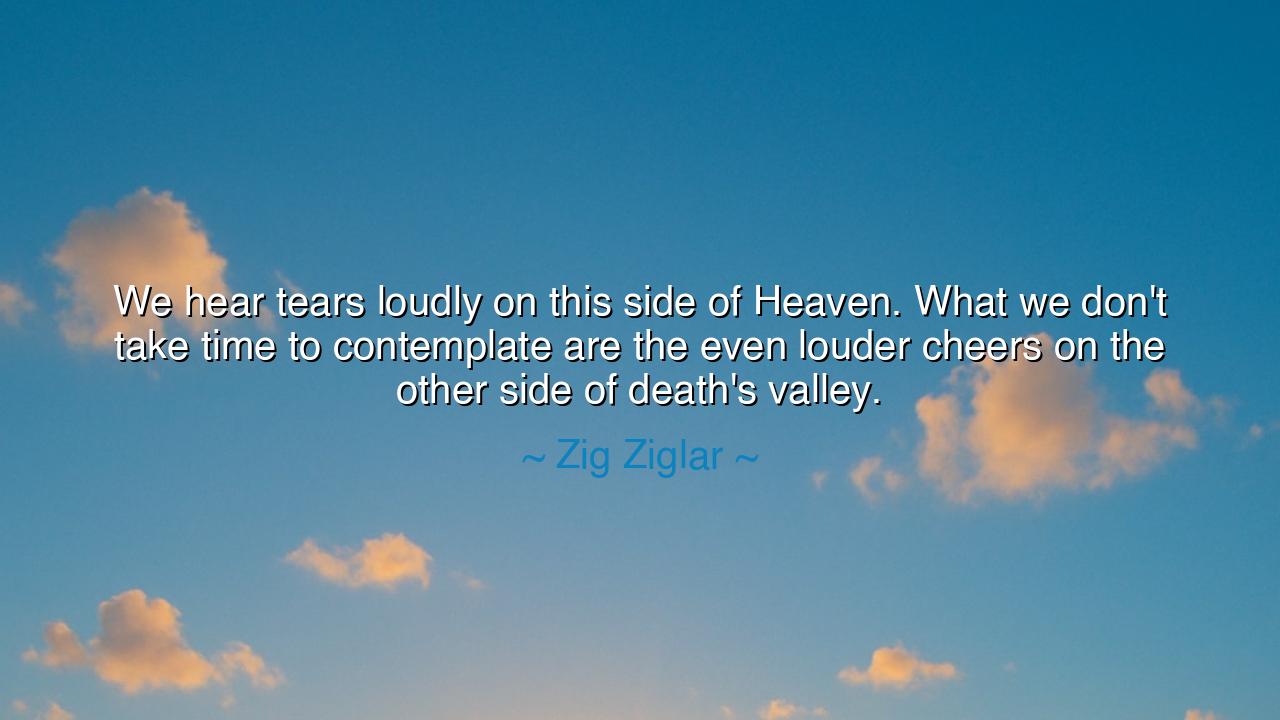
We hear tears loudly on this side of Heaven. What we don't take
We hear tears loudly on this side of Heaven. What we don't take time to contemplate are the even louder cheers on the other side of death's valley.






When Zig Ziglar wrote, “We hear tears loudly on this side of Heaven. What we don’t take time to contemplate are the even louder cheers on the other side of death’s valley,” he spoke as one who understood both the sorrow of the earth and the hope of eternity. His words shine like a lantern held high in the darkness of grief, reminding the living that the end we fear is not a silence, but a song. To the mourning heart, death feels like absence, like the sound of tears echoing through empty halls. But Ziglar, with a faith unshaken, invites us to look beyond the veil — to believe that beyond the valley of loss, there resounds a joyful welcome, a celebration that our mortal ears cannot yet hear.
The origin of this quote rests in Ziglar’s lifelong message of hope, faith, and perseverance. A man known not only for his motivational wisdom but for his unwavering belief in God, Ziglar often spoke of life as a sacred journey — one that does not end at the grave, but merely transforms. He understood that in times of death, we dwell on what is lost: the voice that has gone silent, the hand that will no longer hold ours. Yet, in his wisdom, he teaches that what seems an ending here is a beginning elsewhere. For while we weep at the parting, Heaven rejoices at the arrival. What we perceive as tragedy, the eternal sees as triumph.
The meaning of his words is profound. We live caught between two worlds — the mortal and the divine, the temporal and the eternal. On our side of Heaven, sorrow rings loudly because it is the music of love interrupted. But Ziglar urges us to remember that love never dies; it only crosses over. The one who departs from this life enters the light beyond death’s valley, greeted not with silence but with jubilation — a chorus of souls, ancestors, and angels welcoming them home. What we call death is, in truth, a homecoming. And the cheers that greet it are the fulfillment of all longing, the end of all pain, the dawn of everlasting peace.
The ancients understood this truth well. The philosopher Socrates, on the eve of his execution, told his followers not to grieve, for no man knows whether death is not the greatest of blessings. He believed that the soul, freed from the body, moves into clearer knowledge and purer joy. Likewise, the Stoics taught that life is but a brief watch before dawn, and that beyond it lies the eternity for which all creation yearns. Even the scriptures echo Ziglar’s thought: “Weeping may endure for a night, but joy comes in the morning.” The “valley of death”, then, is not a pit of despair but a passage — shadowed, yes, but leading to glory.
Consider the story of Florence Nightingale, who tended the dying soldiers of war. Around her were the cries of pain, the weeping of the wounded, the silence of those who slipped away. Yet, she would often whisper prayers over their still forms, believing that while she heard sorrow, Heaven heard reunion. She once said that to hold the hand of a dying man was to stand “between two worlds,” where suffering ends and peace begins. Her compassion reflected Ziglar’s truth: that tears and cheers are but two sides of the same divine music — sorrow for the ones who stay, and joy for the ones who go home.
Ziglar’s words are also a reminder to shift our gaze. In moments of loss, the human heart naturally clings to what is gone. We replay memories, ache for what can never return, and feel as though the world has been dimmed. Yet, if we could glimpse what lies beyond — the warmth, the reunion, the radiant peace — our sorrow would be softened by awe. The tears we shed are the proof of love; the cheers in Heaven are the reward of that love fulfilled. In this balance lies the mystery of faith: that every ending is also a beginning, and every shadow hides a light.
So take this lesson, child of earth and spirit: when you stand before death’s valley, do not fear its darkness. Let your grief flow, for it is the measure of love — but do not let it blind you to the greater truth. Believe, as Zig Ziglar believed, that beyond the tears there are cheers, louder than your sorrow, waiting for you and those you love. Live your life with faith so that when your time comes, the heavens will rejoice at your homecoming. And when others depart, weep — but also give thanks, knowing that on the far side of pain, they are embraced by everlasting joy. For the tears of earth are the echoes of Heaven’s applause, and no soul that loves shall ever be lost.






AAdministratorAdministrator
Welcome, honored guests. Please leave a comment, we will respond soon